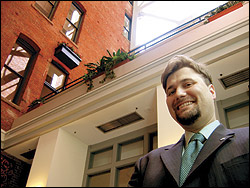2005 is an off year. There are no regularly scheduled elections for Congress, and liberal Democrats cannot do anything about conservative Republicans’ complete and total domination of the federal government, right? Wrong, says Dean Nielsen, state director of Progressive Majority. This year, Nielsen says, liberals need to get busy building the farm team. “If we have any hope of taking back congressional seats,” says Nielsen, “we have to start at the local level.” Seventy-five percent of the members of Congress were once locally elected officials—members of city councils, county councils, port commissions, and school boards. For instance, nine out of 11 of Washington’s congressional delegation began their political careers in local office. If Democrats want to take back the majority in Congress, Nielsen says, they need a pool of locally elected officials who are hungry to move up to the big leagues. “We believe in investing in people,” he says.
Progressive Majority is an independent organization devoted to recruiting and training liberal candidates. After the 2000 election, when conservative Republicans ended up in control of the White House and Congress, Democrats began figuring out what had gone wrong. Progressive Majority was founded the following year in D.C. with the help of liberal members of Congress, including Washington’s senior U.S. senator, Patty Murray. Most of the group’s funding comes from wealthy individuals and labor unions. In 2004, Progressive Majority opened state chapters in Pennsylvania, Wisconsin, and Washington. It has since added chapters in Colorado and Arizona.
At first blush, Washington seems an unlikely candidate for a push by Democrats. We have two Democratic senators (Murray and Maria Cantwell), six Democratic members of the House (Seattle’s Jim McDermott, Bremerton’s Norm Dicks, Tacoma’s Adam Smith, Bainbridge Island’s Jay Inslee, Vancouver’s Brian Baird, and Lake Stevens’ Rick Larson), and only three Republican House members (Auburn’s Dave Reichert, Spokane’s Cathy McMorris, and Pasco’s Doc Hastings). Nielsen points out that some of those Democratic seats recently were occupied by Republicans, and vice versa. “It’s been proven that almost any seat in the delegation can be won by either party,” he says. Moreover, the control of the Legislature has swung back and forth between the two parties in recent years. In addition, Nielsen says, “I don’t believe we can get a strong Democratic majority in Washington, D.C., without winning in Eastern Washington and eastern King County.”
It’s not going to happen overnight. In Washington, Progressive Majority has a staff of three and a $400,000 budget. They hope to work closely with 10 candidates in this year’s local elections. Nielsen says the group will be strategic, focusing on good candidates they can help make better ones and elections where they can help swing control of local governments to liberals. They’ve had success already, helping Democrats take back the state Senate by working on the campaigns of Democratic state Sens. Brian Weinstein of Mercer Island and Craig Pridemore of Vancouver in 2004. Weinstein received communication training and doorbelling help from the group. He is grateful for the help but doesn’t rave about it. “Where I found them to be the most helpful was in the last couple of weeks,” Weinstein says. “Dean Nielsen camped out in my office. I was dead tired, hit pieces were coming out on me. He said, ‘Just stay on message. Don’t worry about it.'”
Former Snohomish County Council member Dave Somers is a good deal more enthusiastic about Progressive Majority. In 2001, Somers, a biologist by training, lost his re-election bid by around 1,500 votes to controversial conservative County Council member Jeff Sax. Control of the County Council switched to a 3-2 Republican majority, and the implications for land use in the fast-growing county north of Seattle are enormous. As a scientist who had worked on salmon recovery, Somers got into politics to prevent sprawl, preserve farmland, and protect rivers. “Time is short,” he says. Somers hopes to take back his seat. He says Progressive Majority has helped him launch a much more aggressive and professional fund-raising effort. Last time, he was outspent two to one by his opponent. The group has also helped him with communication. “I’m a scientist,” Somers says. “I’m used to flashing up slides of data. The normal way for a scientist to talk is not interesting to people. They help me to figure out how to connect with voters.”
All this talk about Progressive Majority being about candidate training is bunk, says Washington State Republican Party Chair Chris Vance. The Democrats already have an extensive infrastructure for training candidates, mostly through labor unions, according to Vance. That’s not the Democrats’ problem. Vance thinks this is more about the liberal wing of the Democratic spectrum fighting for control with the moderate wing. “There is a huge battle for the soul of the Democratic Party,” Vance says. Democrats are trying to figure out if they have lost at the federal level because they are too liberal or too moderate, and Progressive Majority represents the liberals in one skirmish within the larger struggle inside the party. “I just love to see them fight.”
Progressive Majority is unabashedly liberal. It will only work with candidates who are pro-choice, green, and supportive of the rights of workers, people of color, and gays and lesbians. The organization is not focusing on Democratic primary races where moderates and liberals face off. That’s why Nielsen doesn’t talk about races within Seattle much. Instead, he just can’t stop talking about Bellevue, where the group hopes to recruit candidates for City Council. “John Kerry kicked ass in Bellevue,” he says. The Democratic presidential candidate won almost every precinct in the city, according to Nielsen, yet the Bellevue City Council has seven Republicans and no Democrats. Says Nielsen: “We have to show people in Bellevue that Democrats can govern.”








